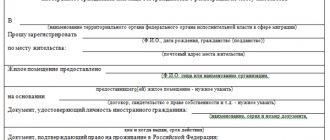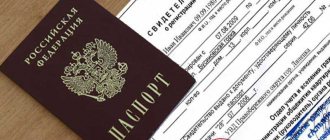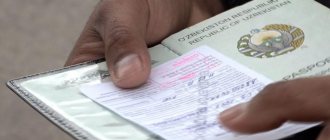Who needs Moscow temporary registration?
Not only guests from foreign countries or the CIS must register. Citizens of the Russian Federation who plan to move to the capital or live there for more than 90 days must also obtain a certificate.
The necessity of the document is established by law, therefore its absence is also punishable by law. Therefore, everyone who wants to live legally in Moscow and does not want to have problems with the law must register.
Temporary registration in Moscow is needed:
- planning to work in the capital. Labor relations can be formalized only if there is registration;
- those who need to register their child for kindergarten or school;
- those who need to obtain a driver's license in Moscow;
- out-of-town or foreign university students;
- those who plan to open their own business in the city;
- for those who do not want to spend money on paid medicine, but want to visit a regular clinic;
- for those who want to take out a loan from one of the capital's banks.
If you want to enjoy all the rights of Moscow residents, you need to register temporarily in the region. You will be able to receive all the benefits and allowances, you will be able to arrange regular payments that are due to you, and also not have to pay for housing and communal services at your place of permanent residence.
Where is temporary registration of citizens of Russia, the CIS and other countries processed?
You can go through the procedure in Moscow yourself or with the help of a lawyer. You can do this in several ways:
- independently contact the required department of the Ministry of Internal Affairs with all the documents and an application;
- write an application through the State Services portal;
- contact the MFC;
- send documents by mail.
It is important to note that you will be allowed into the Ministry of Internal Affairs only if you have previously registered through State Services. To do this, you need an activated account on the portal. The portal also offers temporary registration services. To do this, you can fill out an application directly on the website and enter all your data, and bring the original documents during your personal visit. In order to provide a package of documents, an appointment is not required; admission is carried out on a first-come, first-served basis. To register foreign citizens, as well as citizens of the Russian Federation or the CIS, they will have to go to the registration authorities with the owner of the property, from whom documents will also be required.
To process documents through the MFC, you do not need to register in advance. You can see a specialist every day from 8 to 20.00. And the department requests many certificates on its own. The main disadvantage is the timing. If you are in a hurry to obtain a certificate, this method of registration will not work. Please note that the department must be selected in accordance with the region where you are going to register; institutions from other regions are not allowed to accept applications.
Legal provisions
It is necessary to distinguish between the concepts of private and state property. In the first option, we are talking about privatized housing, which you are allowed to dispose of at your own discretion. In the second, the facility is managed by municipal authorities.
Legal basis in the case of a municipal apartment:
- Civil Code of the Russian Federation;
- Housing Code of the Russian Federation;
- regulatory documents of the Main Directorate for Migration Issues of the Ministry of Internal Affairs (GUVM);
- Law No. 52420-01 of June 25, 1993;
- Decrees of the Government of Russia No. 711 and 713 (dated July 13, 2012 and July 17, 1995, respectively).
Why do you need temporary registration in Moscow?
Registration of temporary registration does not imply deregistration at the place of permanent residence. That is, your registration remains the same as it was up to this point, and in Moscow you are registered. This procedure allows you to assign a citizen of the Russian Federation, the CIS or any other foreign state to a specific address for the period for which an official certificate will be issued. All this time, the person will have the right to live in the house or apartment whose address is included in the document.
However, you should not worry that temporary registration will be without permanent registration in Moscow. According to the law, these forms of registering the legality of residence in the capital are no different from each other; they provide the same rights and opportunities. With a certificate in hand, a person becomes a full-fledged Muscovite.
It is necessary to obtain temporary registration in Moscow if you did not come to the capital as a tourist. If you want to live here for a long time, and specifically, more than 3 months for visitors from other cities and more than 7 days for visitors from other countries, then you cannot avoid official registration.
Why exactly do you need to obtain temporary registration? There are several reasons to take this step. But the main thing is the possibility of legal residence and obtaining full rights and opportunities.
Among the main advantages of having a document:
- you can find a good job in the capital. For illegal immigrants - the position of a laborer or loader. If you came to get a good position and want to earn a decent salary, then legalization of residence is your path. In addition, until you have temporary registration in Moscow in hand, it is simply dangerous to formalize an employment relationship with you - the employer will have to pay a fine, just like you, and this is too high a price to pay for breaking the law;
- you can register your child for kindergarten or school. The fact is that educational institutions accept children in a strict order of priority, and the first in this queue are those registered in the area. Therefore, you may be left either without a place at all in the garden or school, or get it in an inconvenient place where it will be difficult to get to;
- you can open your own business in the capital. Registration of LLC, JSC, individual entrepreneur and other forms of entrepreneurship is possible only if you have a registration document. If you want to start your own business, start by registering;
- you will be able to receive benefits, benefits, social benefits;
- you will be able to take out a loan. The possibility of obtaining a mortgage increases especially significantly, which you should not count on without registration;
- You will be able to undergo medical examinations and visit doctors. This is very convenient and saves you money on paid doctors and tests;
- you can get your license. You will not be issued a driver's license in the capital if you are not registered there, even if you completed training in Moscow;
- you will be able to enter a university;
- you will be able to apply for a visa and Schengen. If you do not register in the capital, you will have to go to your place of permanent residence and submit documents there, which is not always convenient;
- you can significantly reduce your expenses by refusing to pay for housing and communal services at your place of permanent residence, since you can officially confirm that you live in Moscow.
Temporary registration in Moscow and the Moscow region will equalize your rights with native Muscovites.
Why do you need temporary registration?
Employment
Medical services
Registration of a child for kindergarten
School and university
Visa application
Bank loans
Military registration and enlistment office
Registration of individual entrepreneur
Obtaining a driver's license
Extracts from legislative and other normative legal acts regulating the provision of public services for registration of citizens of the Russian Federation at the place of stay and place of residence within the Russian Federation
I. The Constitution of the Russian Federation (adopted by popular vote on December 12, 1993 (with amendments approved during the all-Russian vote on July 1, 2020) (extract)
Article 27
1. Everyone who is legally present on the territory of the Russian Federation has the right to move freely, choose their place of stay and residence.
II. Law of the Russian Federation of June 25, 1993 No. 5242-I “On the right of citizens of the Russian Federation to freedom of movement, choice of place of stay and residence within the Russian Federation” (extract)
Article 1. The right to freedom of movement, choice of place of stay and residence within the Russian Federation
In accordance with the Constitution of the Russian Federation and international human rights acts, every citizen of the Russian Federation has the right to freedom of movement, choice of place of stay and residence within the Russian Federation.
Restrictions on the right of citizens of the Russian Federation to freedom of movement, choice of place of stay and residence within the Russian Federation are permitted only on the basis of law.
Persons who are not citizens of the Russian Federation and are legally located on its territory have the right to freedom of movement, choice of place of stay and residence within the Russian Federation in accordance with the Constitution and laws of the Russian Federation and international treaties of the Russian Federation.
Article 3. Registration of citizens of the Russian Federation at the place of stay and place of residence within the Russian Federation
In order to ensure the necessary conditions for a citizen of the Russian Federation to exercise his rights and freedoms, as well as to fulfill his duties to other citizens, the state and society, registration of citizens of the Russian Federation at the place of stay and at the place of residence within the Russian Federation is being introduced.
Citizens of the Russian Federation are required to register at their place of stay and place of residence within the Russian Federation. Registration or lack thereof cannot serve as a basis for restriction or a condition for the implementation of the rights and freedoms of citizens provided for by the Constitution of the Russian Federation, federal laws, constitutions (charters) and laws of the constituent entities of the Russian Federation.
Article 5. Registration of a citizen of the Russian Federation at the place of stay and deregistration of a citizen of the Russian Federation at the place of stay
Registration of a citizen of the Russian Federation at the place of residence is carried out within a period not exceeding 90 days from the date of arrival of the citizen in the residential premises. Registration at the place of residence is carried out without removing the citizen from registration at the place of residence.
Article 6. Registration of a citizen of the Russian Federation at the place of residence
A citizen of the Russian Federation who has changed his place of residence is obliged, no later than seven days from the date of arrival at his new place of residence, to contact the person responsible for receiving and transferring to the registration authorities documents for registration and deregistration of citizens of the Russian Federation at the place of stay and at the place of residence. residence within the Russian Federation, or to the registration authority with an application in the prescribed form.
The application, as well as the documents necessary for the provision of public services, can be submitted in the form of electronic documents and sent to the registration authority using public information and telecommunication networks, including the Internet, including the Unified Portal of State and Municipal Services.
The registration authority is obliged to register a citizen at the place of residence no later than three days from the date of presentation of documents (submitting an application and documents in the form of electronic documents) for registration.
Article 7. Removal of a citizen of the Russian Federation from registration at the place of residence
Removal of a citizen of the Russian Federation from registration at the place of residence is carried out by the registration authority in the following cases:
change of place of residence - based on a citizen’s application in writing or in the form of an electronic document on registration at a new place of residence;
recognition as missing - on the basis of a court decision that has entered into legal force;
death or declaration of death by a court decision - on the basis of a death certificate issued in the manner prescribed by law;
eviction from occupied residential premises or recognition as having lost the right to use residential premises - on the basis of a court decision that has entered into legal force;
discovery of untrue information or documents that served as the basis for registration, or unlawful actions of officials when resolving the issue of registration - on the basis of a court decision that has entered into legal force;
identification of the fact of fictitious registration of a citizen of the Russian Federation at the place of residence - on the basis of a decision of the registration authority adopted in the manner established by the federal executive body in the field of internal affairs.
Article 8. Grounds for restricting the right of citizens of the Russian Federation to freedom of movement, choice of place of stay and residence within the Russian Federation
The right of citizens of the Russian Federation to freedom of movement, choice of place of stay and residence within the Russian Federation in accordance with the laws of the Russian Federation may be limited:
in the border zone;
in closed military camps;
in closed administrative-territorial entities;
in areas of environmental disaster;
in certain territories and in populated areas, where in case of danger of the spread of infectious and mass non-infectious diseases and poisoning of people, special conditions and regimes for the population’s residence and economic activity have been introduced;
in territories where a state of emergency or martial law has been declared.
III. Decree of the Government of the Russian Federation of July 17, 1995 No. 713 “On approval of the Rules for registration and deregistration of citizens of the Russian Federation at the place of stay and place of residence within the Russian Federation and the list of persons responsible for the reception and transfer of documents to the registration authorities for registration and deregistration of citizens of the Russian Federation at the place of stay and place of residence within the Russian Federation"
These Rules, in accordance with the Constitution of the Russian Federation, the Law of the Russian Federation “On the right of citizens of the Russian Federation to freedom of movement, choice of place of stay and residence within the Russian Federation”, housing, civil and other legislation of the Russian Federation regulate the procedure for registration and removal of citizens of the Russian Federation from registration at the place of stay and place of residence within the Russian Federation.
Registration is established in order to provide the necessary conditions for citizens to exercise their rights and freedoms, as well as to fulfill their duties to other citizens, the state and society.
The registration authorities in cities, towns, rural settlements, closed military camps, as well as in settlements located in the border zone or closed administrative-territorial entities are the territorial bodies of the Ministry of Internal Affairs of the Russian Federation.
Violation of the requirements of these Rules entails liability for citizens, tenants (owners) of residential premises, officials and persons responsible for receiving and transferring documents to registration authorities, in accordance with the legislation of the Russian Federation.
Registration of citizens at the place of stay (clause 9).
Citizens who arrive for temporary residence in residential premises that are not their place of residence for a period of more than 90 days are required, before the expiration of the specified period, to contact the persons responsible for receiving and transferring documents to the registration authorities and submit:
identification document;
application in the established form for registration at the place of residence;
a document that serves as the basis for a citizen’s temporary residence in the specified residential premises.
In the case of registration at the place of residence on the basis of a social tenancy agreement for residential premises concluded in accordance with the housing legislation of the Russian Federation, or a certificate of state registration of the right to residential premises, a citizen has the right not to present these documents, but only indicate in the application for registration at the place of residence their requisites.
In this case, the registration authority independently requests from state bodies, local government bodies information about the documents specified in paragraph five of this paragraph, and registers the citizen at the place of residence no later than 8 working days from the date of submission of the application for registration at the place of residence and the document identification document in accordance with the legislation of the Russian Federation.
Citizens have the right to notify the registration authority about the duration and place of their stay by mail or in electronic form using public information and telecommunication networks, including the Internet, including the federal state information system “Unified portal of state and municipal services (functions).”
Registration authorities are obliged to register a citizen no later than 8 working days from the date the citizen submits an application for registration at the place of residence and other documents necessary for such registration in electronic form in the case provided for in paragraph eight of this paragraph.
Registration of citizens at place of residence (clause 16)
A citizen who has changed his place of residence is obliged, no later than 7 days from the date of arrival at his new place of residence, to contact the persons responsible for receiving and transferring documents to the registration authorities and submit:
identification document;
application in the established form for registration at the place of residence;
a document that, in accordance with the housing legislation of the Russian Federation, is the basis for moving into a residential premises.
A citizen has the right not to present a document that is the basis for the citizen to move into a residential premises (social tenancy agreement, rental agreement for residential premises of a state or municipal housing stock, a state-registered agreement or other document expressing the content of a real estate transaction, a certificate of state registration of the right to residential premises or other document), if the information contained in the relevant document is at the disposal of state bodies or local governments. In this case, the registration authority independently requests from state bodies, local government bodies the relevant document (information contained in it), an extract from the relevant register, other information in accordance with the legislation of the Russian Federation and registers the citizen at the place of residence no later than 8 working days from the date of submission of an application for registration at the place of residence and an identification document in accordance with the legislation of the Russian Federation.
An application in the established form for registration at the place of residence in the form of an electronic document, as well as copies of the documents specified in this paragraph, in electronic form can be submitted through the Unified Portal of State and Municipal Services (functions).
Citizens are considered deregistered at the place of stay in residential premises that are not their place of residence upon expiration of the deadlines specified in their applications for registration at the place of stay.
If a citizen fails to submit an application in the prescribed form and other documents to the registration authority for registration at the place of stay or place of residence within the period established by the legislation of the Russian Federation, the tenant (owner) of the residential premises in which the citizen lives, after the expiration of the period established by the legislation of the Russian Federation deadline, the registration authority notifies within 3 working days of the citizen’s residence in the specified residential premises in the form according to the appendix.
The tenant (owner) of residential premises has the right to notify the registration authority about the period and place of residence of a citizen without registration in person, by mail or electronically using public information and telecommunication networks, including the Internet, including the Unified Portal.
Violation of the deadline for notifying the registration authority about the residence of a citizen without registration entails the responsibility of the tenant (owner) of the residential premises in accordance with the legislation of the Russian Federation.
List of persons responsible for receiving and transmitting to the registration authorities documents for registration and deregistration of citizens of the Russian Federation at the place of stay and at the place of residence within the Russian Federation:
officials of state authorities of the Russian Federation in the field of housing relations, state authorities of the constituent entities of the Russian Federation in the field of housing relations, local government bodies in the field of housing relations, holding permanently or temporarily positions related to the implementation of organizational, administrative or administrative responsibilities for control for compliance with the rules for the use of residential premises of the state and municipal housing stock;
owners who independently manage their residential premises, or authorized persons of a homeowners’ association or housing management organization;
authorized persons of management bodies of housing and housing-construction cooperatives;
authorized officials of multifunctional centers for the provision of state (municipal) services.
IV. Order of the Ministry of Internal Affairs of Russia dated December 31, 2021 No. 984 “On approval of the Administrative Regulations of the Ministry of Internal Affairs of the Russian Federation for the provision of public services for registration of citizens of the Russian Federation at the place of stay and place of residence within the Russian Federation”
The administrative regulations of the Ministry of Internal Affairs of the Russian Federation for the provision of public services for registration of citizens of the Russian Federation at the place of stay and place of residence within the Russian Federation determine the timing and sequence of administrative procedures (actions) of divisions on migration issues of the territorial bodies of the Ministry of Internal Affairs of Russia at the regional and district levels (including migration divisions of police departments (branches, points) of territorial bodies of the Ministry of Internal Affairs of Russia at the district level), as well as the procedure for their interaction with territorial bodies of federal executive authorities, executive authorities of constituent entities of the Russian Federation, local government bodies, persons responsible for the reception and transmission to the registration authorities of documents for registration and deregistration of citizens of the Russian Federation at the place of stay and place of residence within the Russian Federation, when providing state services for registration and deregistration of citizens of the Russian Federation at the place of stay and at the place of residence within the Russian Federation.
The public service is provided by the Ministry of Internal Affairs of the Russian Federation. Direct provision of public services is carried out by registration authorities.
Persons responsible for receiving and transmitting documents to registration authorities, multifunctional centers in the presence of an appropriate agreement on interaction, and organizations of federal postal services take part in the provision of public services.
The result of the provision of public services is the registration of a citizen at the place of residence with the affixing of a registration stamp at the place of residence of the established form in the passport of a citizen of the Russian Federation, identifying the identity of a citizen of the Russian Federation on the territory of the Russian Federation, the passport of a citizen of the USSR, identifying the identity of a citizen of the Russian Federation (before replacing it in established period for a passport of a citizen of the Russian Federation), or with the issuance of a certificate of registration at the place of residence in Form No. 8 for persons under 14 years of age.
The grounds for refusal to accept an application for registration and documents necessary for the provision of public services are:
violation of the established requirements for the form and content of the registration application, including if the text of the registration application is not legible;
lack of documents, the mandatory submission of which is provided for by the Administrative Regulations;
restrictions on freedom of movement, choice of place of stay and residence within the Russian Federation established in accordance with the legislation of the Russian Federation.
The basis for suspension of the provision of a public service is the failure of the applicant to appear within three calendar days after his invitation to an appointment with original documents, if the application for registration, application for deregistration at the place of residence or application for deregistration at the place of stay was submitted through the Unified portal.
V. Code of the Russian Federation on Administrative Offenses (extract)
Article 19.15.1. Residence of a citizen of the Russian Federation at the place of stay or at the place of residence in a residential building without registration
1. Residence of a citizen of the Russian Federation at the place of stay or at the place of residence in residential premises without registration, or permission of such residence by the tenant or owner of this residential premises beyond the time limits established by law -
entails the imposition of an administrative fine on citizens in the amount of two thousand to three thousand rubles; for tenants, owners of residential premises (individuals) - from two thousand to five thousand rubles; for legal entities - from two hundred and fifty thousand to seven hundred and fifty thousand rubles.
2. The violation provided for in Part 1 of this article, committed in the federal city of Moscow or St. Petersburg, -
entails the imposition of an administrative fine on citizens in the amount of three thousand to five thousand rubles; for tenants, owners of residential premises (individuals) - from five thousand to seven thousand rubles; for legal entities - from three hundred thousand to eight hundred thousand rubles.
Note. Citizens of the Russian Federation are exempt from administrative liability for an administrative offense provided for in this article in the following cases:
residence without registration at the place of residence in a residential premises located in the corresponding locality of a constituent entity of the Russian Federation, if they are registered at the place of residence in another residential premises located in the same or another locality of the same constituent entity of the Russian Federation;
residence without registration at the place of residence in a residential premises located in the federal city of Moscow or in one of the populated areas of the Moscow region, if they are registered at the place of residence in a residential premises located in the federal city of Moscow or in one of the populated areas of the Moscow region;
residence without registration at the place of stay in a residential premises located in the federal city of St. Petersburg or in one of the populated areas of the Leningrad Region, if they are registered at the place of residence in a residential premises located in the federal city of St. Petersburg or in one of the populated areas points of the Leningrad region;
residence without registration at the place of stay in a residential premises located in the federal city of Sevastopol or in one of the populated areas of the Republic of Crimea, if they are registered at the place of residence in a residential premises located in the federal city of Sevastopol or in one of the populated areas of the Republic of Crimea;
if they are spouses, children (including adopted children), spouses of children, parents (including adopted), spouses of parents, grandparents or grandchildren of a tenant (owner) of a residential premises who is registered at the place of residence in this residential premises;
if the persons living together with the tenant or the owner of the residential premises are in relation to him spouses, children (including adopted children), spouses of children, parents (including adopted ones), spouses of parents, grandparents or grandchildren.
Article 19.15.2. Violation of the rules for registering a citizen of the Russian Federation at the place of stay or place of residence in a residential area
1. Violation of the rules for registering a citizen of the Russian Federation at the place of stay or at the place of residence in a residential building, if these actions do not contain signs of a criminal offense, shall entail the imposition of an administrative fine on citizens in the amount of two thousand to three thousand rubles; for tenants, owners of residential premises (individuals) - from two thousand to five thousand rubles; for officials - from twenty-five thousand to fifty thousand rubles; for legal entities - from two hundred and fifty thousand to seven hundred and fifty thousand rubles.
2. The violation provided for in Part 1 of this article, committed in the federal city of Moscow or St. Petersburg, entails the imposition of an administrative fine on citizens in the amount of three thousand to five thousand rubles; for tenants, owners of residential premises (individuals) - from five thousand to seven thousand rubles; for officials - from thirty thousand to fifty thousand rubles; for legal entities - from three hundred thousand to eight hundred thousand rubles.
3. Violation, without good reason, by the tenant or owner who provided residential premises to a citizen of the Russian Federation, of the deadlines established by the legislation of the Russian Federation for notifying the registration authority about the residence of this citizen in the specified residential premises without registration, or submitting to the registration authority obviously false information about the registration of a citizen of the Russian Federation if these actions do not contain signs of a criminal offense - entail the imposition of an administrative fine on citizens in the amount of two thousand to three thousand rubles; for legal entities - from four thousand to seven thousand rubles.
4. The violation provided for in Part 3 of this article, committed in the federal city of Moscow or St. Petersburg, entails the imposition of an administrative fine on citizens in the amount of three thousand to five thousand rubles; for legal entities - from seven thousand to ten thousand rubles.
5. Violation by the person responsible for receiving and transferring to the registration authority documents for registration and deregistration of a citizen of the Russian Federation at the place of stay and place of residence within the Russian Federation of the deadlines established by the legislation of the Russian Federation for submitting documents for registration to the registration authority citizens of the Russian Federation or submitting knowingly false documents to the registration authority for registration of a citizen of the Russian Federation, if these actions do not contain signs of a criminal offense, shall entail the imposition of an administrative fine in the amount of three thousand to five thousand rubles.
Notes:
1. Citizens of the Russian Federation are exempt from administrative liability for violating the rules for registering a citizen of the Russian Federation at the place of stay or at the place of residence in a residential building if they provide documented information that they are spouses, children (including adopted children), spouses of children, parents (including adopted ones), spouses of parents, grandparents, grandchildren of tenants (owners) of residential premises who are registered at the place of residence in this residential premises.
2. The tenant (owner) of a residential premises is exempt from administrative liability for violation of the deadlines established by the legislation of the Russian Federation for notifying the registration authority about the residence of a citizen of the Russian Federation in the specified residential premises without registration in the case of:
submission by such a citizen of documented information about his registration at the place of residence in another residential premises located in the same or another locality of the same subject of the Russian Federation;
residence of a citizen of the Russian Federation in a residential premises located in the federal city of Moscow or in one of the populated areas of the Moscow region, if he is registered at the place of residence in a residential premises located in the federal city of Moscow or in one of the populated areas of the Moscow region;
residence of a citizen of the Russian Federation in a residential premises located in the federal city of St. Petersburg or in one of the settlements of the Leningrad region, if he is registered at the place of residence in a residential premises located in the federal city of St. Petersburg or in one of the settlements of the Leningrad region regions;
residence of a citizen of the Russian Federation in a residential premises located in the federal city of Sevastopol or in one of the populated areas of the Republic of Crimea, if he is registered at the place of residence in a residential premises located in the federal city of Sevastopol or in one of the populated areas of the Republic of Crimea.
VI. Civil Code of the Russian Federation (extract)
Article 14. Self-defense of civil rights
Self-defense of civil rights is allowed.
Methods of self-defense must be proportionate to the violation and not go beyond the actions necessary to suppress it.
Article 246. Disposal of property in shared ownership
1. The disposal of property in shared ownership is carried out by agreement of all its participants.
2. A participant in shared ownership has the right, at his own discretion, to sell, donate, bequeath, pledge his share or dispose of it in any other way, subject to the rules provided for in Article 250 of this Code during its alienation for compensation.
Article 247. Possession and use of property in shared ownership
1. Possession and use of property in shared ownership is carried out by agreement of all its participants, and if no agreement is reached, in the manner established by the court.
2. A participant in shared ownership has the right to be given for his possession and use a part of the common property commensurate with his share, and if this is not possible, he has the right to demand appropriate compensation from other participants who own and use the property falling on his share.
VII. Family Code of the Russian Federation (extract)
Article 54. The right of the child to live and be raised in a family.
1. A child is a person who has not reached the age of eighteen years (the age of majority).
2. Every child has the right to live and be raised in a family, as far as possible, the right to know his parents, the right to their care, the right to live together with them, except in cases where this is contrary to his interests.
Children living in the same family and having a common place of residence have the right of priority admission to study in basic general educational programs of preschool education and primary general education in state and municipal educational organizations in which their brothers and (or) sisters study.
A child has the right to be raised by his parents, education, to ensure his interests, comprehensive development, and respect for his human dignity.
In the absence of parents, in the event of deprivation of their parental rights and in other cases of loss of parental care, the child’s right to be raised in a family is ensured by the guardianship and trusteeship authority in the manner established by Chapter 18 of this Code.
Article 66. Exercise of parental rights by a parent living separately from the child.
1. A parent living separately from the child has the right to communicate with the child, participate in his upbringing and resolve issues regarding the child’s education.
The parent with whom the child lives should not interfere with the child’s communication with the other parent, if such communication does not harm the child’s physical and mental health or his moral development.
2. Parents have the right to enter into a written agreement on the procedure for exercising parental rights by a parent living separately from the child.
If the parents cannot come to an agreement, the dispute is resolved by the court with the participation of the guardianship and trusteeship authority at the request of the parents (one of them). At the request of the parents (one of them) in the manner established by civil procedural legislation, the court, with the obligatory participation of the guardianship and trusteeship authority, has the right to determine the procedure for the exercise of parental rights for the period before the court decision enters into legal force.
3. In case of failure to comply with a court decision, the measures provided for by the legislation on administrative offenses and the legislation on enforcement proceedings are applied to the guilty parent. In case of malicious failure to comply with a court decision, the court, at the request of a parent living separately from the child, may make a decision to transfer the child to him based on the interests of the child and taking into account the opinion of the child.
4. A parent living separately from the child has the right to receive information about his child from educational organizations, medical organizations, social service organizations and similar organizations. The provision of information may be refused only if there is a threat to the life and health of the child on the part of the parent. Refusal to provide information may be challenged in court.
VIII. Housing Code of the Russian Federation (extract)
Article 30. Rights and obligations of the owner of residential premises
1. The owner of a residential premises shall exercise the rights of ownership, use and disposal of the residential premises belonging to him by right of ownership in accordance with its purpose and the limits of its use, which are established by this Code.
2. The owner of residential premises has the right to provide possession and (or) use of residential premises belonging to him by right of ownership to a citizen on the basis of a lease agreement, an agreement for gratuitous use or on other legal grounds, as well as to a legal entity on the basis of a lease agreement or on other legal grounds taking into account the requirements established by civil legislation and this Code.
3. The owner of a residential premises bears the burden of maintaining this premises and, if this premises is an apartment, the common property of the owners of the premises in the corresponding apartment building, and the owner of a room in a communal apartment also bears the burden of maintaining the common property of the owners of the rooms in such an apartment, unless otherwise provided by the federal law or contract.
4. The owner of a residential premises is obliged to maintain the premises in proper condition, preventing mismanagement of them, to comply with the rights and legitimate interests of neighbors, the rules for the use of residential premises, as well as the rules for maintaining the common property of the owners of premises in an apartment building.
5. The owner of a residential building or part of a residential building is obliged to ensure the management of municipal solid waste by concluding an agreement with the regional operator for the management of municipal solid waste. For the purposes of this Code and other acts of housing legislation, the management of solid municipal waste means the transportation, neutralization, and burial of solid municipal waste.
Article 70. The right of the tenant to move other citizens into the residential premises he occupies under a social tenancy agreement as members of his family.
1. The tenant, with the written consent of his family members, including temporarily absent family members, has the right to move into the residential premises he occupies under a social tenancy agreement his spouse, his children and parents, or with the written consent of his family members, in including temporarily absent members of his family, and the landlord - other citizens as members of his family living with him. The landlord may prohibit the move-in of citizens as family members living with the tenant if, after their move-in, the total area of the relevant residential premises per family member is less than the accounting norm. The consent of the other members of the tenant's family and the consent of the landlord are not required to move in with the parents of their minor children.
2. Moving into residential premises of citizens as members of the tenant’s family entails a change in the relevant social tenancy agreement for residential premises in terms of the need to indicate in this agreement a new member of the tenant’s family.
Documents for temporary registration
Foreign citizens, citizens of the CIS and the Russian Federation can apply for temporary registration in Moscow.
Citizens, as well as their representatives, can contact specialized bodies if the citizens themselves are children under 14 years of age or incapacitated.
The first thing you need to do is fill out an application. It can be printed on a computer or filled in by hand. Blue or black ink may be used, but may not be crossed out, corrected, erased, or corrected. The application must bear the signatures of the applicant and the owners.
You can obtain temporary registration in Moscow with the following package of documents:
- passport or birth certificate. If you live permanently abroad, you can provide a passport;
- statement. Its form depends on whether documents are submitted in person or via mail;
- basis for living on the premises. To obtain temporary registration at your place of stay, you need some kind of document that can confirm your residence;
- consent of the owner of the property or all owners, if there are several of them. The consent can be notarized, or the owners can be taken with them to the Ministry of Internal Affairs;
- if the registered citizen is under guardianship, a document about this must also be provided.
Negative consequences for the owner
If registration is issued in a house without the right of residence, the owner will be considered the person who has made a fictitious registration. In accordance with Art. 322.2, he can be punished with a fine of 200 to 500 thousand rubles, forced labor or imprisonment for up to 3 years.
By allowing a person to register in his/her living space, the owner will have to agree that:
- permanent registration is issued for an indefinite period;
- a person can register minor children;
- the registered person has the right to reside and use apartment property;
- it is possible to discharge a citizen from a residential premises without his consent only through the court;
- It is very difficult to sell or exchange an apartment with people registered in it.
Learn more about the consequences of temporary registration for the owner.
How long does it take to obtain temporary registration in Moscow?
If a citizen applies in person, registration is completed within three working days. If the package of documents does not include justification for your residence in the living space or a certificate of ownership, the period will increase to 8 working days.
If you sent the documents by mail, then you first need to wait until they reach the department and a notification is sent to you, and then appear in person with the originals. The period depends on the speed of receipt of the letter.
Through State Services, registration will also take three days.
Features of registering children
The law does not provide for the registration of a child without the right of residence. Minor citizens must be registered at the place of registration of their parents. The owner's consent is not required.
The child does not have the right of ownership of the residential premises, but has the full right to reside. It will be difficult to discharge children, especially if there is no other registration.
Find out the specifics of registering a child’s place of residence.
For how long can a temporary registration be issued?
Registration of temporary stay can be for different periods. Usually it is equal to the period of time during which you will live at a specific address. In fact, if you live somewhere for a month, then you can also draw up a document for this period of time. But usually the minimum registration is issued for three months.
If the document is made on the basis of a rental agreement, then it cannot be issued for a period exceeding the rental period. If we are talking about social hiring, then the maximum period for it is only six months.
Also, when registering for temporary registration, you need to consider why exactly you are registering it. For example, to enter a school or kindergarten, it is enough to have a valid certificate at the time of enrollment. But an employment contract cannot be valid longer than the period of registration.
Difficulties may also arise for owners of their own business. It is better for them to buy temporary registration in Moscow for the maximum period. This is 5 years.
Foreign citizens cannot obtain a certificate for such a long period of time. The maximum for them is 12 months. However, registration of temporary residence for such a period is possible only if there is an employment contract.
What to pay attention to
When registering at a place of residence without the right of residence, you should pay attention to the following factors:
- the person will reside permanently or temporarily;
- what type of ownership is the residential premises: state, municipal or private;
- whether the person has minor children;
- a relative or stranger is registered;
- whether the person owns another home.
Permanent registration gives the right to indefinite residence in residential premises. During temporary registration, the period of stay in the home is specified. After this period, the owner has the right to demand that the person leave the living space.
If a person is registered temporarily
Since temporary registration is issued for a certain period, registration for a short period will help to avoid problems. De-registration is carried out automatically from the expiration date. Until this point, forced discharge is possible only through the court.
If temporary registration is issued without the right of residence, the owner of the apartment may encounter difficulties associated with the registration of minor children. The legislation allows citizens to register them at the place of residence of their parents.
A problem arises when the period of temporary registration of the child exceeds the period of registration of the parents, because the court will allow the latter to re-register at this address. The owner will have to appeal this decision in court.
It is important to remember that when providing his/her residential premises for living, the owner is responsible for the lack of temporary registration by the residents. In accordance with the Code of Administrative Offenses of the Russian Federation dated December 30, 2001 N 195-FZ, the owner faces a fine of 2,000 - 5,000 rubles.
Indefinite registration
The range of opportunities for citizens who have permanent registration without the right of residence depends on whose ownership of the apartment is - municipal or private. A citizen registered permanently in a municipal apartment receives the right to participate in the privatization of housing.
If the housing is privatized, the owner will not lose ownership.
Difficulties arise during transactions for the alienation of property. When there is a change of ownership, persons registered in the premises must appear in person and submit an application for deregistration. Forcible deregistration can only be done through the courts.
It is necessary to take into account: the more registered citizens in the apartment, the higher the cost of housing and communal services. There is a need to install meters or decide with the tenant who will pay the bills and in what amount.
Temporary registration of CIS citizens in Moscow
For non-residents of the Russian Federation there are special requirements for registration at the place of temporary residence. Foreign citizens must fill out a notification form and provide a migration card.
The document can only be issued if the foreigner permanently lives in our country, has a temporary residence permit or even a residence permit. A certificate for him is issued at the migration service, where he must register. The registration period is only 7 working days, after which the foreign citizen will become an illegal immigrant.
In all other respects, the registration process is similar. To launch it, you need to have an owner who agrees to register it on their territory and submit an application to the appropriate authorities. You can fill out the application by hand or type it on a computer. It is important not to make mistakes, otherwise it will be returned back. As for citizens of the Russian Federation, visitors from the CIS need to renew their temporary registration in Moscow as soon as its term comes to an end.
For foreigners, the issue of registration is more acute, since in case of non-compliance with the law, they face not the usual fine, but deportation, which for many means the lack of decent earnings and the closure of good prospects.
Where is the best place to go?
Since 2021, the registration of citizens has been carried out by the migration departments of the regional Ministry of Internal Affairs - clause 22 and clause 23 of Order of the Ministry of Internal Affairs dated December 31, 2017 N 984. The Ministry of Internal Affairs accepts applications from citizens directly or through intermediaries in the form of MFCs, passport offices or State Services - clause. 91 Order of the Ministry of Internal Affairs N 984 and Decree of the Government of the Russian Federation of July 17, 1995 N 713.
The instructions and list of documents do not differ depending on the organization you want to contact. So first read the pros and cons of each:
- MFC "My Documents".
Pros - 1) More often the procedure is faster. By law, the maximum period is 3 working days from the date of application. MFCs send documents to the Ministry of Internal Affairs electronically through the system of interdepartmental interaction (SMEV) - clause 35 of Order of the Ministry of Internal Affairs N 984. 3) Employees are more willing to help fill out papers. 3) You can make an appointment with them in advance by phone or through the website. 4) Their service is free.Disadvantages - 1) Not all MFCs provide registration services. First, call your local MFC and check this out. Addresses and telephone numbers are always available on the Internet. 2) Sometimes you have to wait in line, because MFCs also provide other services.
- Passport office of the Management Company (housing department, housing office, homeowners' association, etc.).
Only one plus - usually there are no queues. Cons: 1) The registration period is longer - maximum 6 days. Because they are not connected to the system of interdepartmental interaction with the Ministry of Internal Affairs, therefore documents are transferred in paper form - clause 32 of Order of the Ministry of Internal Affairs N 984. 2) Some passport officers charge about 30-100 rubles for receiving and transmitting documents. In most management companies, this service is already included in the cost of home maintenance, so they don’t ask you to pay anything. The registration procedure itself is always free - clause 62 of Order of the Ministry of Internal Affairs N 984. - Regional Ministry of Internal Affairs.
Pros - 1) You can make an appointment or submit an application through State Services. 2) They will register the next day at most (clause 36 of Order of the Ministry of Internal Affairs N 984), but here there is a big nuance.Cons: 1) You can get an appointment for at least 8 days. Usually 10 - 12. As a result, you will have to wait longer than when contacting the MFC or passport office. 2) According to paragraph 91 of Order of the Ministry of Internal Affairs N 984, you are allowed to come without an appointment or make an appointment by phone, but it is easy to stumble upon long queues. Moreover, more of those who signed up in advance. And they rarely answer the phone. 3) They are reluctant to provide advice on filling out documents.
Now you can read the instructions themselves. About applying to the MFC/passport office is described below, and about the Ministry of Internal Affairs here is a link.
Fines for lack of registration at the place of stay
If you are afraid of the cost of temporary registration, you need to know that its price is not comparable to the fines that you have to pay due to its absence. Moreover, not only those who do not have a certificate are fined equally, but also those who did not have time to renew it.
For citizens of the Russian Federation, the fine amounts to 2000-7000 rubles. This is a small amount, but if the violator is caught, both the person who rents him the house and the employer will be checked. For these people, fines amount to tens or even hundreds of thousands.
Without official temporary registration in Moscow, fines are also imposed on foreigners. For them, the likelihood of punishment is higher, since the documents must be completed within a week. The amount of fines is small, the worst thing is deportation without the right to return to the Russian Federation.
In order not to let yourself down, as well as those who will hire you and rent you housing, you need to buy temporary registration in Moscow. It will allow you not only to avoid fines and punishments, but also to receive equal rights with Muscovites.
If you can’t do it yourself, contact a lawyer for help.
Service cost
The registration procedure itself is free for citizens of the Russian Federation, regardless of whether permanent or temporary registration is issued. The absence of payment remains in the case when the application is submitted through a multifunctional center or the State Services portal. But when using postal services, be prepared to incur some costs. They are not related to the collection of fees for the registration process itself, carried out by the territorial body of the Ministry of Internal Affairs, but to payment for the services of postal workers; their price, as a rule, is not particularly high. The responsibilities of specialists include:
- Provide application forms and samples for filling them out.
- Consult citizens about the completeness of documentation in a particular case.
- Check the provided forms with the originals and certify the accuracy of the data.
- Arrange for the entire package to be sent to the Main Migration Department of the Ministry of Internal Affairs.
- Deliver the finished certificate.
In addition, a person can receive intermediate information about the date of delivery to the registration authority and the planned time of receipt of the certificate.
Questions and answers about temporary registration
Where to register, in Moscow or in the Moscow region?
Depends on what you need registration for. If for work, then there is no difference. And if to enroll in a school, kindergarten or for service in a clinic, you need to be assigned to a specific region.
Is personal attendance required?
A citizen’s employer can draw up documents for a citizen. Also, the issue of registration can be handled by the university, if you are studying there full-time, or the institution where you live (hotel, sanatorium). In all other cases, personal presence is required.
What is the difference between registration in Moscow for a foreigner and a Russian?
The difference is in the time frame (7 days for a foreigner and 90 days for a Russian) during which the document must be issued, as well as in the period of its validity (1 year maximum for foreigners and 5 years maximum for citizens of the Russian Federation). Foreigners will also need additional documents.
Customer Reviews
Alexander
Thank you. I am satisfied.
I was afraid that I would have to chase the courier if I was late. And they sent me an SMS with his number, and he arrived on time. Unexpectedly pleasant. Moscow region, Dzerzhinsky
Elena
Thank you, this is not the first time you have helped me out with registration.
It's a pleasure to do business with you! Moscow region, Odintsovo
Svetlana
We transferred our daughter to another school and ordered registration from you for our entire family.
Thank you, we did everything quickly. Moscow region, Lyubertsy
Vladimir
I applied for registration to take it to work, but everything worked out.
Thank you, I was a little worried. I recommend. Moscow region. Mytishchi
Marina
Thanks to your operator, she explained everything politely and patiently.
I ordered for the bank and decided all my affairs. I will contact you again if necessary Moscow region, Podolsk
Maksim
This is not the first time I order, everything is fine.
Documents are completed in one day. Moscow region, Balashikha
Sergey
Thank you, I'm pleased with the quality.
Fast, inexpensive, I recommend. Moscow region, Krasnogorsk
Irina
I needed an electronic version of registration, I thought I would have to go somewhere to pick it up and then scan it.
And they quickly sent it to me in the right form by email. I'll pick up the original later, thank you) Moscow









